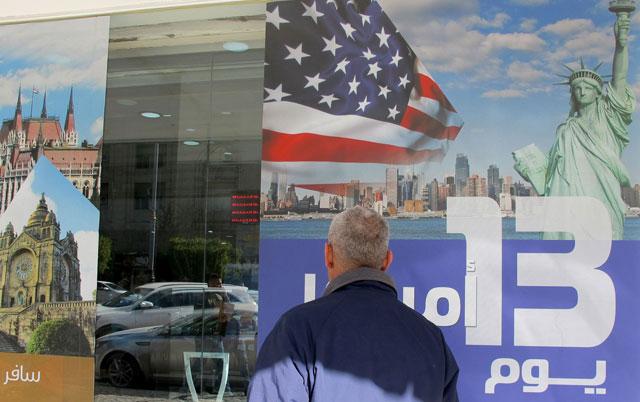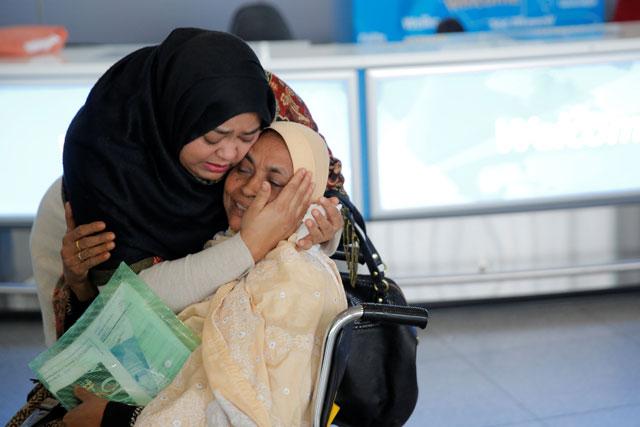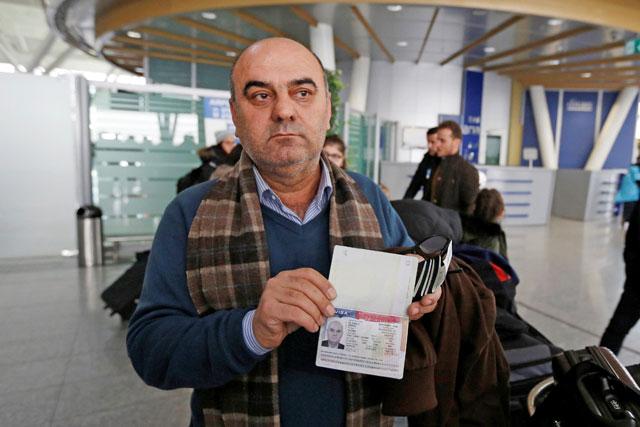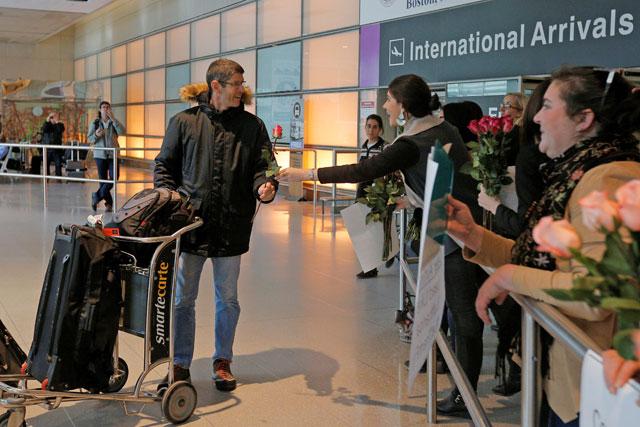You are here
Trump bars door to refugees, visitors from seven mainly Muslim nations
By Reuters - Jan 28,2017 - Last updated at Jan 28,2017

An Iraqi man stands next to an ad for a 13-day trip to the United States at a travel agency in the capital Baghdad on Saturday, a day after the US president signed a new executive order to suspend refugee arrivals and impose tough controls on travellers from seven mainly-Muslim countries, including Iraq (AFP photo)
WASHINGTON/CAIRO — Five Iraqi passengers and one Yemeni were barred from boarding an EgyptAir flight from Cairo to New York on Saturday after President Donald Trump halted the entry of citizens from seven Muslim-majority countries, sources at Cairo airport said.
The passengers, arriving in transit to Cairo airport, were stopped and re-directed to flights headed for their home countries despite holding valid visas, the sources said.
Trump on Friday put a four-month hold on allowing refugees into the United States and temporarily barred travellers from Syria and six other Muslim-majority countries, saying the moves would help protect Americans from terrorist attacks.
He said his most sweeping use of his presidential powers since taking office a week ago, barring travelers from the seven nations for at least 90 days, would give his administration time to develop more stringent screening procedures for refugees, immigrants and visitors.
“I’m establishing new vetting measures to keep radical Islamic terrorists out of the United States of America. Don’t want them here,” Trump said earlier on Friday at the Pentagon.
“We only want to admit those into our country who will support our country and love deeply our people,” he said.
The bans, though temporary, took effect immediately, causing havoc and confusion for would-be travellers with passports from Iran, Iraq, Libya, Somalia, Sudan, Syria and Yemen.
Besides Cairo it was not immediately clear whether other airports of countries listed by Trump had swiftly implemented the ban. Arab officials of the listed countries would not comment on the matter.
The order seeks to prioritise refugees fleeing religious persecution, a move Trump separately said was aimed at helping Christians in Syria. That led some legal experts to question whether the order was constitutional.
One group said it would announce a court challenge on Monday. The Council on American-Islamic Relations said the order targets Muslims because of their faith, contravening the US Constitutional right to freedom of religion.
“President Trump has cloaked what is a discriminatory ban against nationals of Muslim countries under the banner of national security,” said Greg Chen of the American Immigration Lawyers Association.
Trump has long pledged to take this kind of action, making it a prominent feature of his campaign for the November 8 election. But people who work with Muslim immigrants and refugees were scrambling to determine the scope of the order.
Even legal permanent residents — people with “green cards” allowing them to live and work in the United States — were being advised to consult immigration lawyers before travelling outside the country, or trying to return, according to Muslim Advocates, a civil rights group in Washington.
On Friday evening, Abed Ayoub of the American-Arab Anti-Discrimination Committee said he had fielded about 100 queries from people anxious about the order, which he said he believed could affect traveling green card holders, students, people coming to the United States for medical care and others. “It’s chaos,” Ayoub said.
Syrian refugees
During his campaign, Trump tapped into American fears about Islamic State militants and the flood of migrants into Europe from Syria’s civil war, saying refugees could be a “Trojan horse” that allowed attackers to enter the United States.
In December 2015, he called for a ban on all Muslims entering the United States, drawing fire for suggesting a religious test for immigrants that critics said would violate the US Constitution.
His idea later evolved into a proposal for “extreme vetting.”
Trump’s order also suspends the Syrian refugee programme until further notice, and will eventually give priority to minority religious groups fleeing persecution.
Trump said in an interview with the Christian Broadcasting Network that the exception would help Syrian Christians fleeing the civil war there.
Legal experts were divided on whether this order would be constitutional.
“If they are thinking about an exception for Christians, in almost any other legal context discriminating in favour of one religion and against another religion could violate the constitution,” said Stephen Legomsky, a former chief counsel at US Citizenship and Immigration Services in the Obama administration.
But Peter Spiro, a professor at Temple University Beasley School of Law, said Trump’s action would likely be constitutional because the president and Congress are allowed considerable deference when it comes to asylum decisions.
“It’s a completely plausible prioritisation, to the extent this group is actually being persecuted,” Spiro said.
The order may also affect special refugee programmes for Iraqis who worked for the US government as translators after the 2003 invasion of Iraq.
It is already affecting refugees and their families, said Jen Smyers of the Church World Service, a Protestant faith-based group that works with migrants. Smyers said she spoke to an Iraqi mother whose twin daughters remain in Iraq due to processing delays. “Those two 18-year-old daughters won’t be able to join their mother in the US,” she said.
Political fire
Democrats on Friday were quick to condemn Trump’s order as un-American, saying it would tarnish the reputation of the United States as a land that welcomes immigrants.
“Today’s executive order from President Trump is more about extreme xenophobia than extreme vetting,” said Democratic Senator Edward Markey in a statement.
Some Republicans praised the move. Representative Bob Goodlatte, chairman of the House of Representatives Judiciary Committee, said Daesh has threatened to use the US immigration system, making it important to do more screening.
“I am pleased that President Trump is using the tools granted to him by Congress and the power granted by the Constitution to help keep America safe and ensure we know who is entering the United States,” Goodlatte said in a statement.
Without naming Trump, Iranian President Hassan Rouhani said on Saturday it was no time to build walls between nations and criticised steps towards cancelling world trade agreements.
Trump on Wednesday ordered the construction of a US-Mexican border wall, a major promise during his election campaign, as part of a package of measures to curb illegal immigration.
“Today is not the time to erect walls between nations. They have forgotten that the Berlin wall fell years ago,” Rouhani said in a speech carried live on Iranian state television.
He made no direct reference to Trump’s order regarding refugees and travelers from the seven mainly Muslim states.
Rouhani, a pragmatist elected in 2013, thawed Iran’s relations with world powers after years of confrontation and engineered its 2015 deal with them under which it curbed its nuclear programme in exchange for relief from sanctions.
Rouhani said earlier this month that Trump could not unilaterally cancel the nuclear deal and that talk of renegotiating it was “meaningless”.
France and Germany voiced disquiet on Saturday over Trump’s new restrictions on immigration.
“Welcoming refugees who flee war and oppression is part of our duty”, French Foreign Minister Jean-Marc Ayrault said at a joint news conference with German counterpart Sigmar Gabriel.
“The United States is a country where Christian traditions have an important meaning. Loving your neighbour is a major Christian value, and that includes helping people,” said Gabriel. “I think that is what unites us in the West, and I think that is what we want to make clear to the Americans.”
Related Articles
WASHINGTON — President Donald Trump's sweeping ban on people seeking refuge in the United States and visitors from seven Muslim-majority cou
BAGHDAD/CAIRO — A global backlash against US President Donald Trump's immigration curbs gathered strength on Sunday as several countries inc
BEIRUT/DAMASCUS/WASHINGTON — Citizens of seven mainly Muslim countries who were banned from the United States by President Donald Trump can



















